Daniel Kaluuya Is Cool to Keep You Guessing
- Oops!Something went wrong.Please try again later.
- Oops!Something went wrong.Please try again later.
- Oops!Something went wrong.Please try again later.
- Oops!Something went wrong.Please try again later.

When the pandemic sent us into lockdown, Daniel Kaluuya watched a film a day. He opens the Notes app on his phone to show me the film diary he created. There are dozens of titles logged, along with notes. Juice. The Game. Interstellar. He tells me about falling back in love with The Prestige and watching every film Jay-Z’s Roc-A-Fella Records produced, including Paid in Full and Paper Soldiers, in order of release. It was the first time he’d really slowed down, and a much-needed reset after the intensity of spending the past five years on film sets.
It’s a sweltering June afternoon and we are at Cara, a posh boutique hotel hidden in a congested pocket of Los Feliz. We’re seated in an airy courtyard adorned with olive trees, warm minimalist furniture and a serene reflecting pool. The vibe is low-key, and the hotel is within walking distance from his crash pad. For years Kaluuya has split his time between Los Angeles and his native London at varying lengths, depending on mood and his work schedule.
More from The Hollywood Reporter
“I got some dough, I don’t got kids. I can go back and forth,” he says. “People make big moves out here. That’s really inspiring to me.”
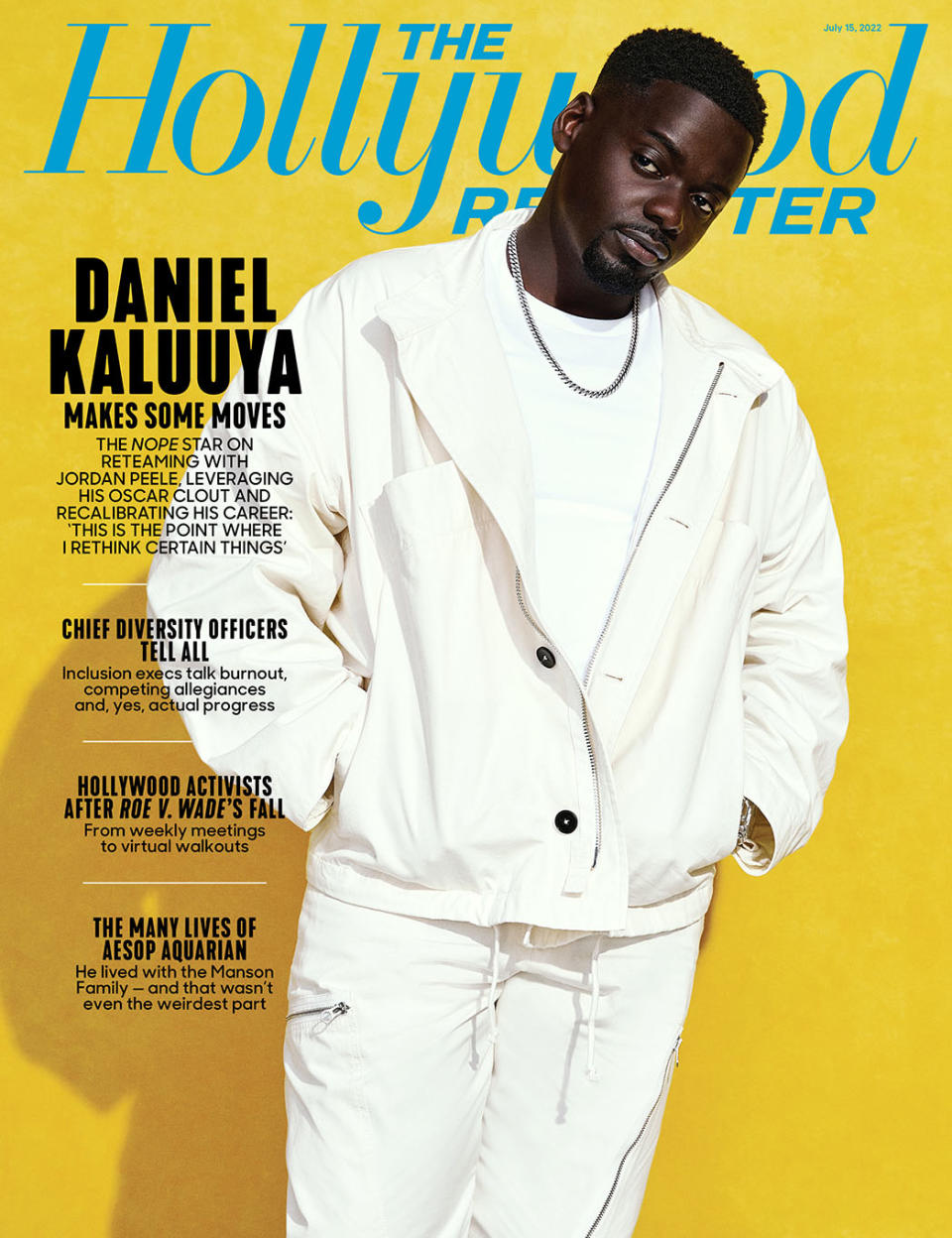
Photographed by Obidi Nzeribe
Dressed in black jeans and a loose black T-shirt adorned with an image of legendary soul singer Al Green, Kaluuya is affable and charming. At 33, he’s built a career that could very well set him up to be the perennial leading man of his generation if that’s what he wants. Get Out. Black Panther. Widows. Queen & Slim. Judas and the Black Messiah. And those are just a few years’ worth of big-screen highlights for an actor who has moved across theater, television and film since he was a teenager growing up in northwest London.
“Even though Daniel’s a friend — he’s like a brother at this point — I still think of him as an artist that I admire,” says Lena Waithe, the writer of 2019’s Queen & Slim. “He’s very confident. He’s very clear. He’s got this sort of steel thing. He’s cool. He’s not easily rattled. Sometimes you can see a worry in his eyes, or a concern. But he’s always standing on his feet. He’s always ready to take on whatever that’s coming his way, and I think that’s what makes him such a leading man.”
Kaluuya’s barn burner of a performance as Fred Hampton in Judas earned him a Golden Globe, a BAFTA, a SAG Award and an Oscar in 2021. It’s the sort of victory lap that thrusts an actor into a new terrain of fame. More attention. More opportunities. More power. “It just blows the doors open … that sort of recognition,” he tells me.
“But my trajectory wasn’t really linked to accolades. The way I’ve designed it, I didn’t expect an Oscar to come around. I had this term ‘accessible excellence,’ because I thought a lot of excellence is inaccessible,” Kaluuya explains. “Whether I’m in nearly every shot, like Get Out, or if I’m [only shooting] for 11 days, like Widows, I cared about the quality of the film first. What did it want to say? What does the director want to say? Did they have a soul to it? Was it accessible? Was it excellent? I think you can have both. You can reach an audience and have the high level of craft. Either-or didn’t satisfy me.”
It wasn’t necessary to ask Kaluuya for an example of this accessible excellence he speaks of, given the number of billboards and displays for Nope I passed on the crosstown drive to meet him. The anticipation for Kaluuya’s reunion with Get Out director-writer Jordan Peele can’t be overstated. As with all of Peele’s work, the theories are aplenty online. Maybe the film is about aliens. Maybe it’s an allegory on the treatment of immigrants and refugees. Maybe it’s about surveillance. Or horses. Or parallel universes. Maybe it’s all those things. Maybe it’s none of those things. Part of the fun of Peele’s work is guessing, and then watching it repeatedly and interrogating what we think he’s saying — about us, about the world — through that work. “It’s about the spectacle and how alluring that is, even if it’s not reality,” Kaluuya says with a coy smile.
In the film, Kaluuya plays OJ Haywood, a Hollywood horse trainer whose father passes away under a mysterious circumstance. “His life is different, and he’s now living alone on his ranch, except he has a sister who also comes in and joins him. Together, they realize that there’s something in the area that is not leaving,” Peele tells me over email of the role he wrote specifically for Kaluuya.
“Daniel is my all-time favorite actor, and having worked on a couple of things apart and then coming back together, it just was a reminder of this special working bond that we have together,” Peele says. “He’s somebody who has an innate sense of his character — always asking the right questions to unlock things further. I utilized the fact that Daniel is just so immensely watchable, and he has this powerful stillness to him. Daniel’s the type of performer that doesn’t need words to communicate. He’s somebody that in these quiet moments brings the audience in more.”
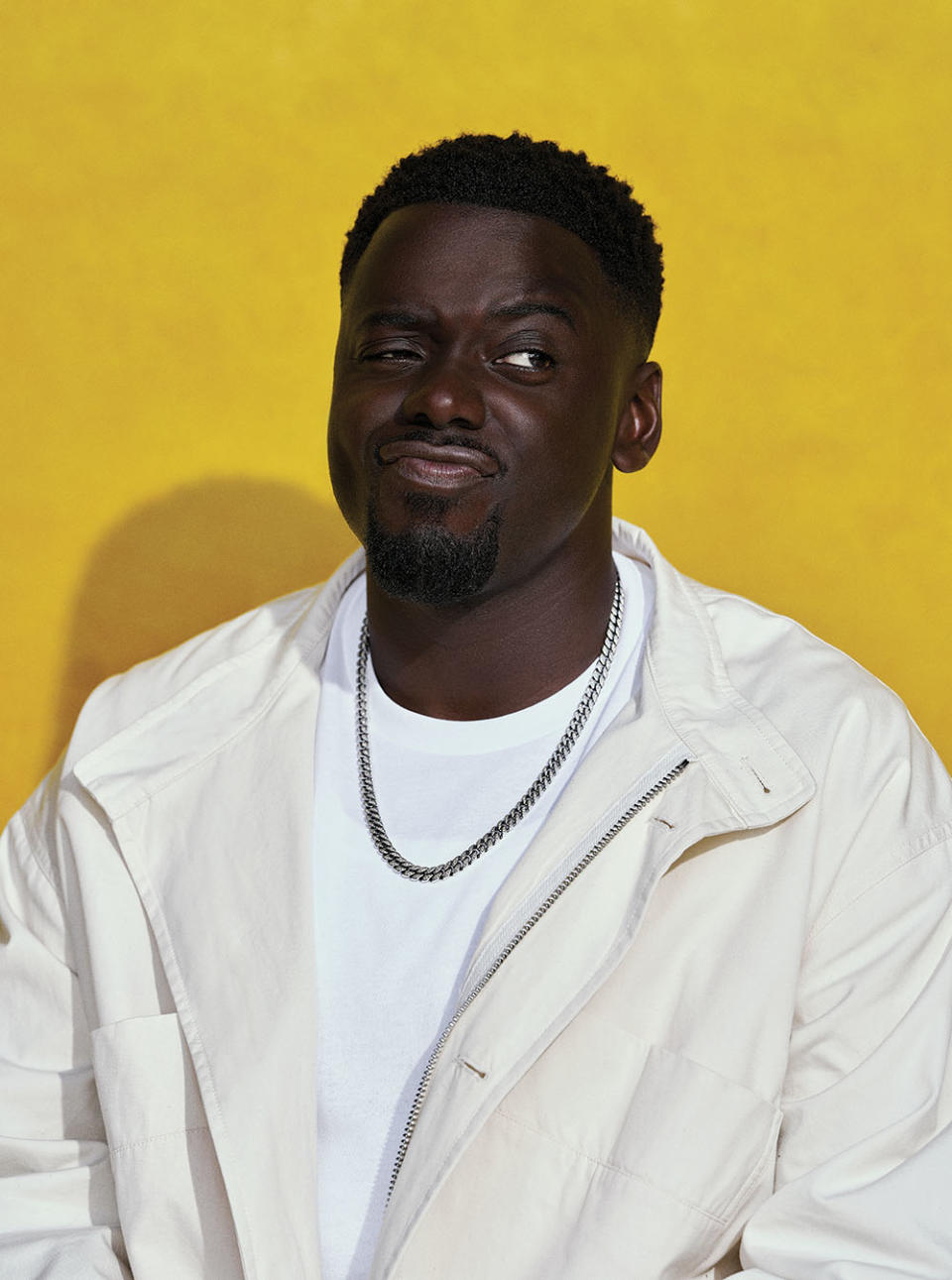
Photographed by Obidi Nzeribe
Nope filmed in a gulch outside Santa Clarita last summer as we were all trying, and failing, to rebound amid the pandemic. Shooting a thrilling sci-fi horror blockbuster was a welcome distraction from the heaviness still enveloping the world. “I think we were both super grateful to be working and also into the film we were doing,” says Keke Palmer, who plays Kaluuya’s sister, Emerald — making Nope the rare summer blockbuster centered on Black siblings. “Daniel and I actually hung out often while filming, having barbecues at his house [in L.A.]. Our dynamic is like brother and sister. I have a true admiration for him that comes off as teasing most times. He’s very gracious as an actor. He truly has incredible instincts and trusts them.”
Though Kaluuya can’t say much about Nope, I ask if he’s feeling any of the pressure that comes with reuniting with the director responsible for launching him to a global audience. Get Out was a groundbreaking comedy-horror satire that had so much to say about race in contemporary America, and Kaluuya’s portrayal of a young Black photographer visiting his white girlfriend’s liberal parents for the first time is etched in our collective consciousness. The film has lived on through memes, continuous homages and critical discourse. Kaluuya and Peele are fully aware that we are already putting a lot on their reunion and will be searching every frame of the film for some meaning or social critique.
“I don’t take the pressure. I like accomplishing the goals that we’ve set,” he says as we snack on charred shishito peppers. “It was more [about] working with Jordan. Coming back and doing this with him. We had a lot of conversations building up to the shoot, and when I got to the set, I was like, ‘Oh shit, this is a fucking action film. Holy shit.’ The most daring thing to do is go for it, [so] let’s do Bruce Willis then. Let’s go for this shit. I really care about original films and original content, and to even be making a film like this with Keke Palmer as a lead, me as a lead, Jordan as a director on this level of budget and it be original — it’s so important that this film connects.”
I want to revisit the trajectory he says he designed for himself.
What did that look like for you?
“Well, I’ve come to the end of it,” he says.
What makes you say that?
“A feeling.”
A feeling?
“A feeling of the end of the chapter. Get Out happened and it’s just been nonstop. Even though I don’t feel like I’ve been projecting that. But it has been nonstop in terms of the amount of films I’ve done, the amount of press I’ve done, and all the writing and producing I’ve done underneath. It’s just been consistently on the go, and I feel like you have to rethink certain things. This is the point where I rethink certain things. What makes me happy? What’s exciting? What excites me? What will excite the audience? And it could be the same trajectory that I’m on, but I’ve got to make sure it’s that.” What that next chapter looks like, Kaluuya has only just begun sorting out for himself, but he confirms that it will include less time in front of the camera as he writes and produces projects under his 59% Productions banner.
***
The son of Ugandan immigrants, Kaluuya grew up in London’s Camden Town with his mother and older sister. When he was 9, a teacher noted that he was a busy child and needed to find an outlet for his brain. “Daniel is a distraction to himself and others” were her exact words. The microaggression resulted in a play he wrote, inspired by the slapstick comedy of Nickelodeon’s classic ’90s sitcom Kenan & Kel. The play, about two friends working at a McDonald’s, won a local competition and was performed at London’s Hampstead Theatre, a place he’d return to as a teenager to write and perform in productions. He got into improv and acting classes at arts clubs in his neighborhood, a passion he kept secret from his classmates and friends.
“One person found out because they were linking with some girl that was in my class. He pulled up to one of the showcases and I was like, ‘What the fuck are you doing here?’ ” he recalls with a laugh. “I was 16. He was the first person from my life that had seen me act and he said, ‘You’re going to make it.’ ”
Kaluuya landed his first role shortly after, appearing in the BBC drama Shoot the Messenger, which starred David Oyelowo. Two years later, he booked a small part on the teen cult drama Skins and worked in the writers room for two seasons. Acting on television, in the theater and in short films was a fine substitute for the drama school education he couldn’t afford, and he juggled his nascent screen career with local theater work. It was Kaluuya’s performance in award-winning British playwright Roy Williams’ Sucker Punch that shifted things for him. There were rave reviews and awards that came his way, and now he was on the radar of filmmakers like Steve McQueen, who later cast him in a villainous turn for the 2018 heist thriller Widows. Sucker Punch also led to Kaluuya being cast in the haunting “Fifteen Million Merits” episode of the British Black Mirror in 2011, a performance that made Peele consider him for Get Out. We know the story from there.
“He’s always had an amazing presence, always been crazy versatile as an actor,” says multidisciplinary artist Kibwe Tavares, a friend of Kaluuya’s for nearly a decade after directing him in the 2013 short Jonah, which was nominated for the Sundance short film grand jury prize. “He throws himself in. He’s not scared to go there and experiment and find it with you, really. And he’s a writer, so everything comes from a place of a proper deep understanding of story.”
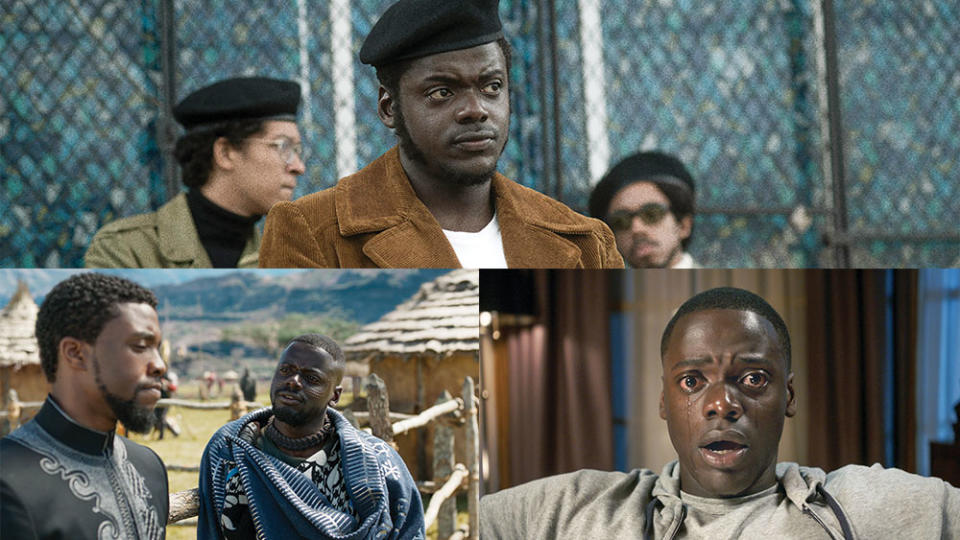
Courtesy of Glen Wilson/Warner Bros.; Courtesy of Universal Studios; Courtesy of Marvel Studios/Disney
A few weeks before we met, Kaluuya was in London finishing principal photography on The Kitchen, his feature writing debut that’s been eight years in the making. The film, directed by Tavares, hasn’t gone to edit, but Kaluuya hands me his cellphone so that I can watch a few minutes of footage, so long as I don’t reveal any details. “We worked our fucking asses off in London. It’s going to change the game, I genuinely believe that,” he says of the dystopian thriller, which will debut on Netflix globally in 2023.
Kaluuya began imagining The Kitchen with Tavares while they shot Jonah, and the two further developed the project at the Sundance Screenwriting and Directing Lab in 2016. The Kitchen is set in London, 2044, a future where economic inequality has stretched beyond limits. All forms of public housing have been eradicated, sending the working class to the outskirts of the city. The Kitchen is London’s last village housing residents who refuse to be pushed out of their homes. The story follows the bond between residents Izi and 12-year-old Benji (played, respectively, by British grime pioneer Kane “Kano” Robinson and young newcomer Jedaiah Bannerman) as they battle to survive in a system that is stacked against them. Kaluuya co-wrote the script with Joe Murtagh (Calm With Horses) and pulled from his own grief over watching the district where he grew up change over the years.
“The thing people don’t see when they see someone who’s made it is the graft and the grind,” says Tavares, who makes his feature directorial debut with the film. “He’s been doing this for, what, 16 years now? He’s got a really interesting view on the world, and hopefully this will be the opportunity for him to do more stuff. He’s going to do it anyway, because you can’t really stop him.”
“Accessible excellence” is the mantra for Kaluuya and his partners at 59% Productions, which gleans its name from the win rate outlined in Michael Lewis’ Moneyball: The Art of Winning an Unfair Game.
“It could be a flipping game show, as long as it feels authentic and it feels exciting,” Kaluuya says. “One of my cornerstones is the [marketing] book Purple Cow. I love that book. That’s how I based all my decisions: Is the premise remarkable? Is it to be remarked upon? Is the story good enough for you to hear it in a day and then go back to whoever you live with, and go, ‘Yo, I heard this shit.’ That’s all I feel a film should be. I want those stories.”
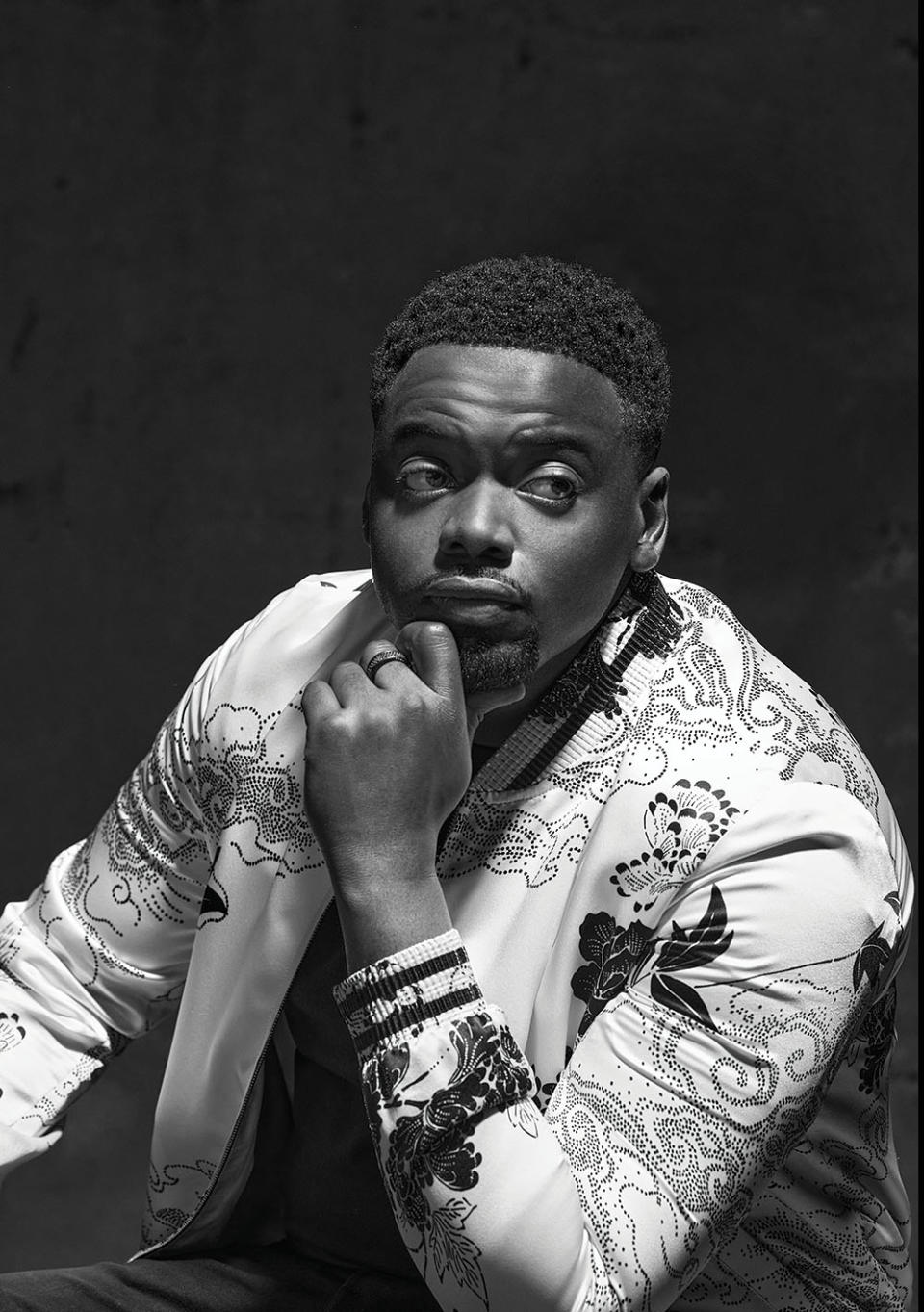
Photographed by Obidi Nzeribe
The first release under 59% will be the Regina Hall and Sterling K. Brown prosperity gospel satire Honk for Jesus. Save Your Soul. Adapted from a 2018 short of the same name, the comedy from the filmmaking Ebo twins — writer-director-producer Adamma Ebo and producer Adanne Ebo — follows pastor Lee-Curtis Childs (Brown) and his first lady, Trinitie (Hall), as they work to rebuild the congregation of their Atlanta megachurch in the wake of a scandal. After the film’s debut at Sundance earlier this year, it was acquired by Focus Features, Peacock and Peele’s Monkeypaw imprint and will hit theaters and Peacock on Sept. 2.
Kaluuya’s production slate is still firming up, and he’s reluctant to discuss what’s in the pipeline at 59%, but one of the first projects announced was a live-action film based on the iconic purple dinosaur Barney. He confirmed that the project is still in early development and the script is being reworked. After I tell him how left-field the movie sounds, we find ourselves having a conversation about our shared childhood trauma of discovering that Barney’s framing of a world wasn’t as simple as “I love you, you love me / We’re a happy family.”
“My last number of films have been so aligned to kind of what I stand for as a man,” he says. “But there are a whole lot of things that I do as a man. I love kids’ films. How did everyone get into films? Watching kids’ films. I don’t want to restrict myself to the limitations of what I’m perceived as.”
How do you feel you are perceived? I ask.
“A bit serious,” he says. “A bit, not mysterious, but like I don’t give too much away.”
You do not.
“So, I think people don’t know what to take that as. And so then they go, ‘Well, what is that?’ ” Kaluuya then turns the focus to me: “What do you think? What’s my perception? I think you are better equipped than me in this situation.”
From the outside, Kaluuya’s public image appears to be one of reticence. He doesn’t talk about who he’s dating, he’s not letting us into the minutiae of his private life on social media, and he’s rarely in the crosshairs when it comes to celebrity gossip or scandal, which only encourages the public to fill in the blanks of who he may be.
In hanging with him for a few hours, I saw flashes of what those close to Kaluuya told me about him: disarmingly funny, curious, gregarious, warm. There’s an earnest determination on his part to subvert our perceptions of him, so he’s going full Bruce Willis in Nope, producing a movie about a purple dinosaur that inspired (and scarred) a generation of kids, and searching for projects that bring him joy. “The one thing I’ve realized in this whole journey I’ve been on in my acting career is that people will project everything onto you. [A role] will mean this to this person, mean that to that person,” he says. “The fact that someone wants to put meaning on it is the gift. It’s not for me to control.”
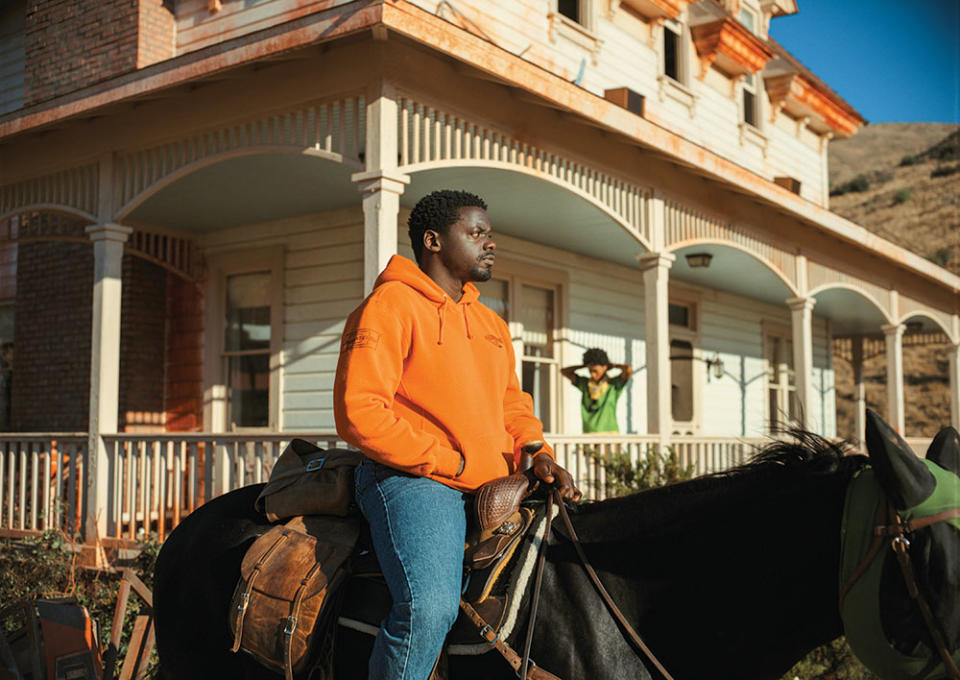
Courtesy of Universal Pictures
That enigmatic perception around Kaluuya made it easy for some to gravitate toward an odd rumor that took off a few months ago. The gossip circulating around town was that he had found himself under the influence of a New Age-type life strategist who calls herself Heir Holiness. It was reported that he had abruptly fired his agency, CAA, as well as his publicists and stylists, at her urging and that those around Kaluuya were deeply concerned that a woman who describes herself as “a spiritual gangster serving a life sentence in a human body” was in control of his life.
“It showed me that I was in a paradigm of fame,” Kaluuya says. “An unnamed, unverified source has more credibility than what is actually said and the truth of the situation. Like, ‘Wow, so a bunch of people decided it’s happening, then it’s happened?’ And it’s like, well, that’s not what’s happened.”
Changing representation is hardly unusual in the industry (if a little more so after winning an Oscar). It’s true that Kaluuya doesn’t have a U.S. agent at the moment, but he’s still with the same U.K. agents and U.S. managers he’s always had. He’s not paving new terrain by choosing to navigate Hollywood this way (Jennifer Lawrence and Leonardo DiCaprio come to mind), but I was curious about this idea that he wasn’t making decisions of his own volition and was being viewed as unstable. He’s a Black actor navigating a largely white industry and there was an implication that he had made irrational career decisions simply because folks were trying to connect the dots between a business decision he made for himself and his association with a mysterious spiritual guide. It’s clear Kaluuya feels the weight of that. He says it feels like people don’t believe Black actors are acting when they tackle a film like Get Out. “They think we’re playing ourselves,” he says, pointing to countless headlines suggesting he was in the “sunken place” as a play on his breakout role. I ask if he feels compelled to address the rumor directly. He doesn’t, because whatever he says only “confirms the perception and the perspective of the situation.
“And so you can’t answer it … but you can be seen as difficult in that situation because the thought behind the question doesn’t make sense,” he says. “A lot of these stories are just about journalists being perplexed about things, and then that’s the story. I understand. I just find it odd because everyone’s different.”
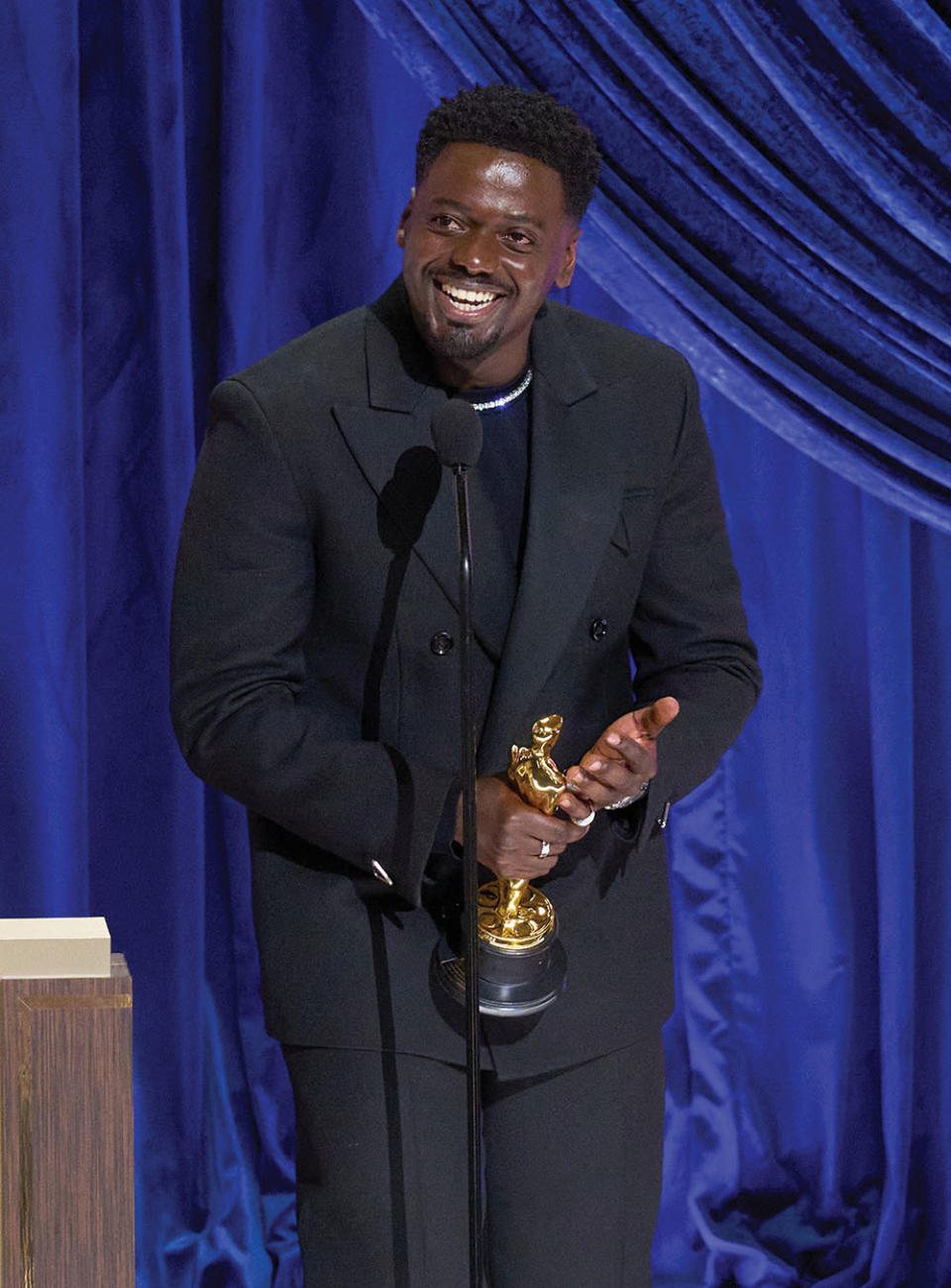
Todd Wawrychuk/A.M.P.A.S. via Getty Images
After Nope, it was widely believed Kaluuya would next be seen in the long-awaited Black Panther sequel. “If I said anything, people would be really disappointed. That’s how I feel about it. I think people will be disappointed. They don’t want to be spoiled. They’re surprised in whatever will happen. That’s what was amazing about the first one,” he tells me. But Kaluuya recently revealed he was unable to reprise his role for Black Panther: Wakanda Forever, saying that its filming conflicted with the production of Nope. He says it’s even tough to talk about the anticipation of Wakanda Forever without considering the heaviness of losing original star Chadwick Boseman in 2020 after a years-long battle with colon cancer that he kept out of the public eye. “What can you say? Legit, and I mean that in a real sense, what can you say? Watching him do the first one, knowing what I know, knowing what everyone [now knows], you just look at him in a different stratosphere. As a character, as a human being. I mean …” His voice trails off.
In the time we spend hanging out after our interview, I learn more about his passions outside of filmmaking. He’s interested in curating community around art. One way into that was connecting Monkeypaw and Universal to Nigeria-born, Brooklyn-based artist Jide Osifeso to create a capsule merch collection for Nope. Another way is by bringing people together through music and throwing private parties. It’s mostly a way for him to hear music out loud with friends and not have to deal with being in the club (unless he’s going to catch a DJ he’s following). It’s all cut from his goal of simply bringing joy to people, something he was reminded of when he watched the classic rom-com When Harry Met Sally … two days in a row during his epic pandemic film binge.
“I’m trying to do that. That’s what I’m trying to say by ‘the end of a chapter,’ because that’s what I want to do. How do you put joy in the film? That’s hard. That’s so fucking difficult. To make someone cry is actually not that difficult. It’s triggers. Obviously making a good film is a different task of difficulty. But in terms of bringing joy to people? That’s really hard to do.”
This story first appeared in the July 15 issue of The Hollywood Reporter magazine. Click here to subscribe.
Best of The Hollywood Reporter

